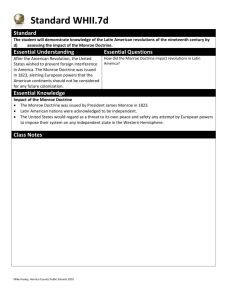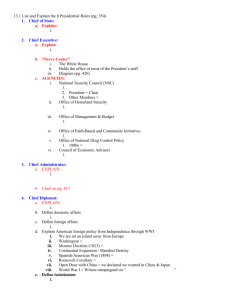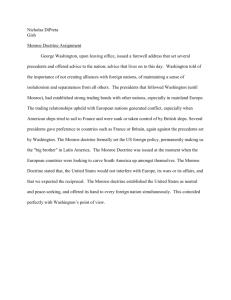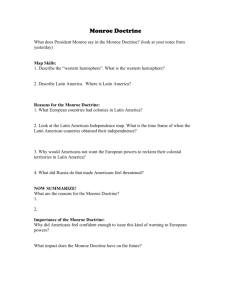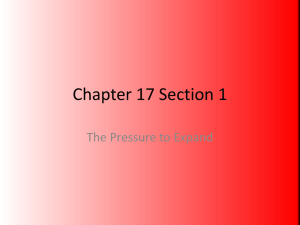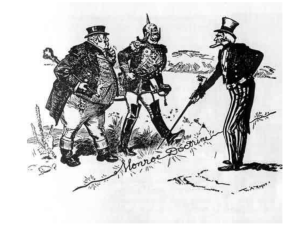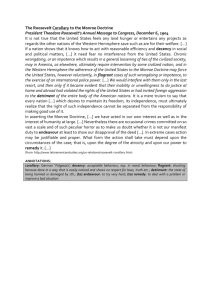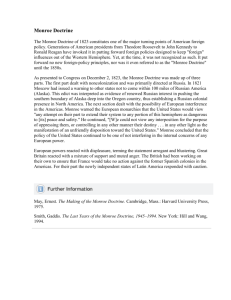Monroe Doctrine Socratic Seminar Lesson Plan
advertisement
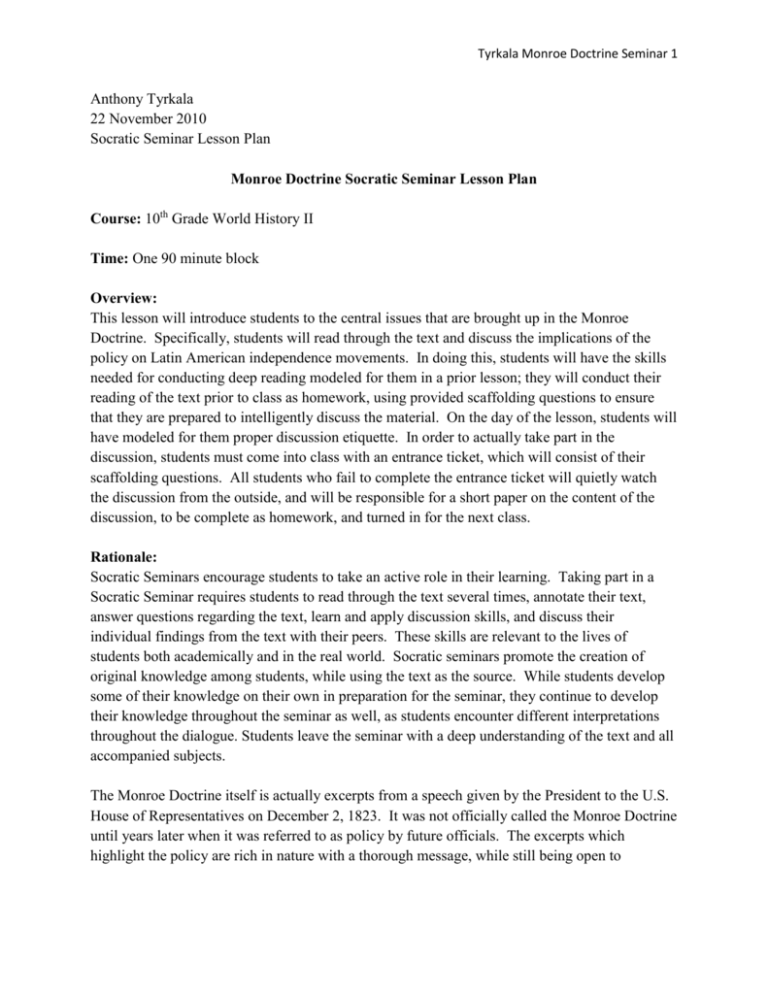
Tyrkala Monroe Doctrine Seminar 1 Anthony Tyrkala 22 November 2010 Socratic Seminar Lesson Plan Monroe Doctrine Socratic Seminar Lesson Plan Course: 10th Grade World History II Time: One 90 minute block Overview: This lesson will introduce students to the central issues that are brought up in the Monroe Doctrine. Specifically, students will read through the text and discuss the implications of the policy on Latin American independence movements. In doing this, students will have the skills needed for conducting deep reading modeled for them in a prior lesson; they will conduct their reading of the text prior to class as homework, using provided scaffolding questions to ensure that they are prepared to intelligently discuss the material. On the day of the lesson, students will have modeled for them proper discussion etiquette. In order to actually take part in the discussion, students must come into class with an entrance ticket, which will consist of their scaffolding questions. All students who fail to complete the entrance ticket will quietly watch the discussion from the outside, and will be responsible for a short paper on the content of the discussion, to be complete as homework, and turned in for the next class. Rationale: Socratic Seminars encourage students to take an active role in their learning. Taking part in a Socratic Seminar requires students to read through the text several times, annotate their text, answer questions regarding the text, learn and apply discussion skills, and discuss their individual findings from the text with their peers. These skills are relevant to the lives of students both academically and in the real world. Socratic seminars promote the creation of original knowledge among students, while using the text as the source. While students develop some of their knowledge on their own in preparation for the seminar, they continue to develop their knowledge throughout the seminar as well, as students encounter different interpretations throughout the dialogue. Students leave the seminar with a deep understanding of the text and all accompanied subjects. The Monroe Doctrine itself is actually excerpts from a speech given by the President to the U.S. House of Representatives on December 2, 1823. It was not officially called the Monroe Doctrine until years later when it was referred to as policy by future officials. The excerpts which highlight the policy are rich in nature with a thorough message, while still being open to Tyrkala Monroe Doctrine Seminar 2 interpretation by readers, making it an excellent text to engage students in a Socratic seminar around. Text for the Seminar: The Monroe Doctrine Necessary Resources: -A class set of “Monroe Doctrine Text” Handouts given in the class prior to lesson, an additional 15copies of the “Monroe Doctrine Text” Handouts on the day of the lesson. Standards: Virginia SOL WHII.7d The student will demonstrate knowledge of the Latin American revolutions of the nineteenth century by d). assessing the impact of the Monroe Doctrine. Virginia SOL WHII.1a a). Identify, analyze, and interpret primary and secondary sources to make generalizations about events and life in world history. NCSS Theme #3 People, Places, and Environment NCSS Theme #9– Global Connections Objectives: 1. Students will identify the Monroe Doctrine as a U.S. policy issued by President James Monroe referring to U.S. maintaining control over Western Hemisphere. 2. Students will identify the Monroe Doctrine as a U.S. policy that declared their noninterference with other nations issues. 3. Students will be able to state that the Monroe Doctrine declared that the U.S. recognized Latin American countries’ independence movements as legitimate on a unit test. 4. Students will be able to specify that the Monroe Doctrine refers specifically to European nations not operating in the Western Hemisphere. Skills: 1. Students will be able to read through a text, highlighting the important information, and taking notes in preparation for a discussion. 2. Students will be able to display proper etiquette when engaging classmates in discussion during a Socratic seminar; including, proper posture, eye contact, paying attention, referring to the text, and referring to previously stated facts. Tyrkala Monroe Doctrine Seminar 3 Assessment: 1. Students will be formatively assessed throughout the seminar based on their involvement in the discussion. Participation is not a requirement; however I will observe whether or not students are paying attention to the discussion. I will also take notes on student’s discussion etiquette; this will serve to reinforce proper discussion skills following the lesson as well as in future discussions. The skills of discussion are not going to be learned completely in a single lesson, and these students rarely engage in discussion. Rather than grading their ability to discuss, I will use the information to decide what skills need to be reinforced for future lessons. 2. The students will be formally assessed in a variety of ways. The entrance ticket and notes from the text will be one of the primary tools for gauging student’s preparation. Students will also be accessed through their post-discussion answers and reflection to gauge their understanding of the text. The reflections will only slightly factor into the overall grades, but will be important for gauging the effectiveness of the seminar, and the development future discussions. 3. Students understanding of this material will primarily be assessed when they complete a unit test, as well as on benchmark and SOL testing. The unit test will feature questions specific to this lesson including questions such as; What did the Monroe Doctrine mean for the following: independence movements in Latin America? European Nations operating in the Western Hemisphere? The United States? 4. Those students who failed to complete an “entrance ticket” will be required to show me their notes prior to leaving the class. I will mark on their sheets whether they will get partial credit for the discussion, and will then instruct them to complete a handwritten, or typed one page paper on the Monroe Doctrine. The students will be told to use the guiding questions to form their paper. Those who must complete this assignment because of absence will be given an opportunity to receive full credit, while those who did not complete their entrance ticket can earn up to ¾ credit. Background Information: After the American Revolution, the United States wished to prevent foreign interference in America. The Monroe Doctrine was issued in 1823, alerting European powers that the American continents should not be considered for any future colonization. Latin American Revolutions were discussed in the previous unit, and students will now turn their attention towards the American policy put forth under the Monroe Doctrine, and its influence on Latin American countries’ independence. Class Configuration: Desks will be pre-arranged in a circle. I will sit outside of the circle, as will all students who did not complete an entrance ticket. Tyrkala Monroe Doctrine Seminar 4 Seminar Lesson: I. Preparation: (Day 1) A. Students will each be given a copy of the Monroe Doctrine in the class prior to the seminar. Being that this is a modified block schedule, students will have at least one day to prepare their text. B. Students will first receive an explanation of deep reading, in this explanation it will be emphasized that the text must be read multiple times. 1. I will suggest that students first read through the entire text, making no extraordinary attempts to read deeply. a. This initial reading is just to familiarize them with the text. 2. Secondly, students will be told that they should read through the text sentence by sentence, making note of each sections main topic. a. In this reading students should define words that they do not fully understand. b. Students should work to put the topic in their own words. c. Some sections will require more work than others. d. Students will have this modeled for them with the entire first section of the Monroe Doctrine, i. this section has been chosen because it seems very difficult, and will encourage students by showing that even something that seems to make little sense can be easily deciphered. ii. Additionally, the overall message of the doctrine is introduced in this section, and will give students an initial understanding of the document. C. Students will be responsible for completing their close readings, and answer the questions at the end of the text for entrance into the discussion. 1. Students will be told that they must both write additional notes in the space provided, and answer the questions at a minimum for entrance. 2. They will be encouraged to prepare as much as possible, and bring any additional notes with them. 3. The discussion will only be as good as the students want it to be, they will be explicitly told that they should work as hard as possible to create a positive discussion environment on the day of the seminar. 4. Students will not receive instruction on proper discussion etiquette and seminar procedures until the day of the seminar. a. This decision was made because of the importance of the skills, and the need for students to have recently covered them. Tyrkala Monroe Doctrine Seminar 5 II. Seminar: (Day 2) A. Students will find their seat within the circle. 1. Each seat will be marked with a nameplate. B. The lesson will begin with instruction on proper discussion etiquette including: 1. sitting with proper posture 2. establishing eye contact with classmates as you speak 3. speaking loudly and clearly enough for all in the room to hear. C. Participating in a Socratic Seminar also requires additional skills; students will be instructed to: 1. speak without raising their hands 2. reference previous statements in reference to your comments a. disagreements are fine, but there is no attacking peers 3. speaking to peers and not the teacher 4. referencing the text when making a point. D. Students must also ensure that they are not monopolizing the conversation, or remaining too quiet. 1. Participation will not be a graded requirement for this lesson a. this decision was made because of the lack of experience students have with the seminar format, and the large size of the class. b. Instead, students will be graded based on a combination of their verbal and written content, as well as their final written responses. E. After I am confident students fully understand all of the proper etiquette and procedures, the seminar will begin. 1. All students will already have annotated copies of the text, as well as their entrance tickets. a. All students who did not complete an entrance ticket will be handed a “Monroe Doctrine Text” handout, on which they will be required to take notes on the discussion. b. these notes will be used to complete a paper on the Monroe Doctrine discussion. c. Once all students who are not participating in the seminar are moved outside of the circle, the circle will be closed in, and the actual discussion will begin. F. To begin the discussion I will ask the following question: 1. What does the Monroe Doctrine say about Latin American Countries? a. In awaiting an initial response it may be necessary to use a significant amount of wait time. i. I will issue the question and give the students plenty of time to respond. Tyrkala Monroe Doctrine Seminar 6 ii. I suspect that someone will eventually answer the question, as it will be very similar to one of their scaffolding questions. iii. Furthermore, I will use wait time again if the discussion stalls, in order to force the discussion to continue further than a mere mentioning of a few facts. b. If after approximately 30 seconds no student continues this portion of the discussion, I will ask follow up questions such as: i. What does the policy say about Latin American countries independence? ii. What does the policy say about the United States’ opinion of their independence? -Are they viewed as independent nations? iii. How does the United States say European countries should treat Latin American nations? c. The order of the questions will depend largely on the flow of the discussion. The overall goal is to be involved in the discussion as little as possible because as the teacher I am only responsible for facilitating the discussion. i. In order to do this, I will have each question that I predict will guide the discussion in front of me, and I will mark them off as they are discussed. ii. I will also write possible questions that will effectively probe the students based on actual responses during the discussion. G. Another aspect that I expect to be discussed is the actual policy itself, a question such as: 2. What is the overall U.S. policy that is communicated by the Monroe Doctrine? a. This question has been chosen second rather than first because it will receive more specific responses after already touching on the importance of Latin American independence. b. Some probing questions that may go along with this includes: i. What does the United States say about European nations operating in the Western Hemisphere? ii. What does the policy say about the U.S. interfering in other nation’s issues? iii. When will the U.S. get involved in other nation’s issues? iv. What does it mean for the U.S. to treat actions as a threat to their safety? (a)How does that communicate the importance of this policy? Tyrkala Monroe Doctrine Seminar 7 H. The goal at the end is to explore the implications of such a policy. Students will be asked to consider the following question: 1. Why would the US take on this policy, what does it say to other countries outside of the western hemisphere? a. The question features little in terms of factual information available within the text for an answer. i. Instead, students are expected to draw upon current knowledge of U.S. expansion in North America. ii. The fact that there is no explicit answer in the text does not excuse students from referencing the text; (a) students are still expected to reference text sections in justifying their hypotheses. (b) Additionally, students will be encouraged to read between the lines, and consider any possible explanation for such a strategy. b. Expected responses include: i. U.S. hoping to be free to control the western hemisphere with little competition. ii. U.S. managing to keep Europe from gaining in strength. iii. U.S. caring about the independence of Latin American nations. c. Probing questions for this section will depend entirely on the flow of the discussion. d. It will be important early to allow students to control the discussion, and use wait time to entice students to participate. III. Debrief: A. Immediately following the seminar, remaining in the circle, students will be asked to voice their opinion on the success of the seminar. 1. Specifically they will consider; a. how well did the class as a whole follow proper discussion etiquette and seminar procedures b. how successful was the class at reading the text and communicating information from the text. c. The discussion itself is designed to cover all of the content, there will be no specific content related review following the discussion. B. The content from the discussion will be assessed on a unit test, as well as benchmark and SOL testing. 1. Students will encounter a review of the information when the class reviews all of the unit material. Tyrkala Monroe Doctrine Seminar 8 C. The last step of the seminar will to have the students write a reflection on the discussion. This will take place in two separate parts: 1. First students will be instructed to re-answer each of the three questions from their entrance ticket in their own words on the back of their handout. a. This will allow students to reflect on their opinion before and after the discussion. 2. After students complete the first part, they will be given approximately five minutes to write their feelings on their own participation in the discussion. a. They will be told to consider what they did well, b. what they did poorly, c. how they could improve, d. and what they learned. Differentiation: Several steps were taken in composing this lesson to make the text more accessible, including the numbering of each line for quick reference, and the decision to model the reading of the first section because of its difficulty. Some ways that this text could be made even more accessible include rewording some of the text, pulling out the essential information and making a bulleted list, or providing students with an additional handout featuring additional explanations for each section. Steps could also be made to use this lesson plan with students who already have significant experience conducting discussions. Some of those steps could include shortening the discussion etiquette explanation, and doing away with name plates. If there are significantly large numbers of students that did not complete the entrance ticket, I could provide time in class to work through the text prior to discussion. Doing this would permit the discussion to to include as many students as possible. Lastly, if the classroom has too many students, I could incorporate a fishbowl technique to have smaller groups, encouraging more participation Accommodation: To accommodate students with exceptionalities the students in my class that have 504 plan/IEP accommodations will be allowed to take a seat outside of the circle if they at any time feel overly anxious. Additionally students with ADD/ADHD will have the seminar procedures explained to them verbally, at that time they will be instructed to either take a seat outside of the seminar if they feel restless. Those students will also be shown the directions, which are in bold on the worksheet prior to completing their handout. If needed students can have the text read aloud to them, either at home or by a specialist within the school, or they can have a completed handout given to them if their accommodation calls for additional notes. Tyrkala Monroe Doctrine Seminar 9 Reflection: -Conducting a seminar feels like a big risk. I believe in my students and their ability to learn the material in this manner, but giving up all control leaves numerous factors up in the air. I am embracing this challenge, and preparation will be imperative in order to quickly handle any potential problems. Some of the issues have already been built into the lesson plan such as he possibility of students not initially speaking. I will utilize extended wait time in an effort to get the discussion going, if that does not work, I have developed several questions that should work to stimulate conversation. With this being the first time students will conduct this type of lesson, I predict that there will be a great deal of apprehension, and I will explicitly tell them that this is not about the educator spoon feeding all of the knowledge to them, as they are used to. It is about them taking responsibility for their knowledge, and displaying their ability to formulate their own understanding.
